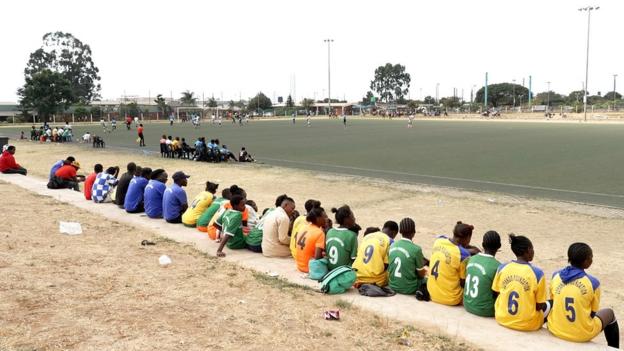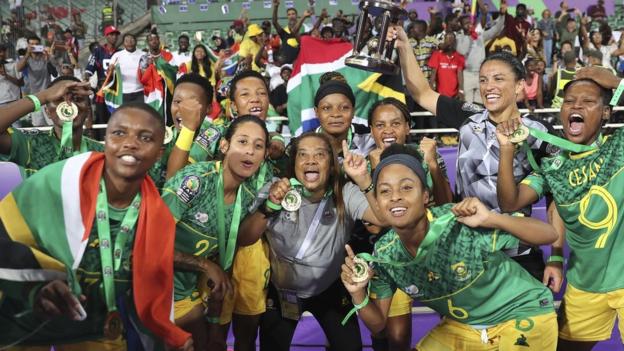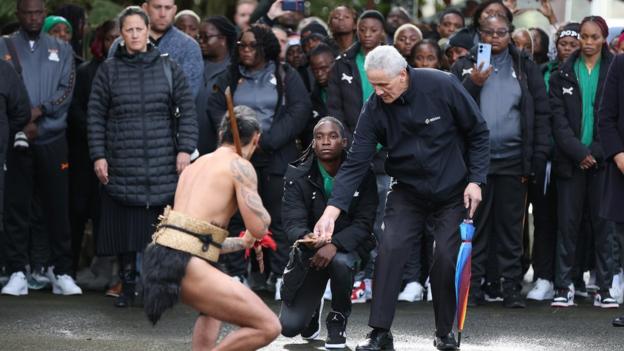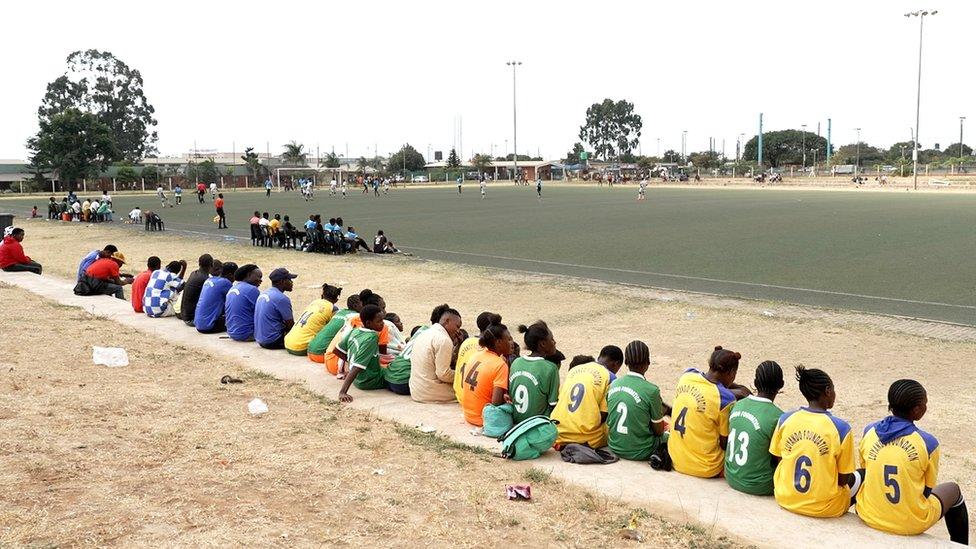This time last year, as a major women’s championships hurtled into view, Barbra Banda was crestfallen as Zambia’s star striker learned she could not contest the Women’s Africa Cup of Nations (Wafcon).
The July 2022 tournament was key as it served as a qualifying event for the World Cup, which Zambia had never reached, and not just because it allowed the Copper Queens another shot at lifting the trophy.
But just a day before the finals began in Morocco, a fit and healthy Banda was told she could not play – on gender eligibility grounds that she struggled to understand.
“It was very difficult,” the striker, 23, told BBC Sport Africa.
Her enforced absence was especially puzzling as one year earlier, she had been contesting the Olympic football competition, which is overseen by world governing body Fifa – and dazzling too.
Despite being named in Zambia’s original Wafcon squad, she was now deemed ineligible after her testosterone levels were adjudged to be naturally overly high.
Fast forward to the Women’s World Cup, which starts on Thursday and where Zambia will face Japan, Spain and Costa Rica, and Banda is all set to play once again.
While her confusion – and many others’ – may be understandable, so too is her delight at being allowed to compete at women’s football’s greatest event, with Australia and New Zealand co-hosting the competition’s first 32-team finals.
“It’s a dream come true,” says a relieved Banda, who watched from the stands in Morocco as her team-mates secured an unprecedented third place, and thus a World Cup berth, at Wafcon.
“Every player dreams of playing at a bigger level, and the World Cup is the highest level of football, so I’m very happy and excited.”
Rule Change
In the days after Banda was deemed ineligible for Wafcon, chaos over her absence reigned as both the Zambian FA (Faz) and the Confederation of African Football (Caf) appeared to have differing views.
“All players had to undergo gender verification, a Caf requirement, and unfortunately she did not meet the criteria set by Caf,” Andrew Kamanga, the Faz president, told BBC Sport Africa at the time.
When asked how Banda could contest the Olympics but not Wafcon, Caf’s communications director told the BBC “there is no such decision from the Caf medical committee”.
Instead, it transpired that Faz officials had ruled out Banda themselves after following guidelines determined by the African football body, which – problematically – differ to Fifa’s.
Caf rules stipulate that all female players must undergo a pre-tournament gender verification test, whereas Fifa – which leaves it to federations to ensure players meet the gender criteria – only asks for tests if there have been complaints about a player’s gender.

“The difference with the Fifa one is very simple,” Kamanga recently told the BBC.
“You have to have a protest, a procedure and the player has to consent to being subjected to all those things. I think the Fifa rule respects the privacy of the individual more than the Caf one.”
In the run-up to Wafcon, Banda – who plays her club football in China – took medication to reduce her testosterone levels, yet these had not come down enough by the time the African championships started.
Nonetheless, shortly after the tournament, she was back playing for Shanghai Shengli, given the contrasting approach to gender eligibility rules, which Kamanga wants harmonised.
“Just like the offside rule, where everyone uses the same rule, so the same should apply [regarding gender criteria] from club level right through to national teams.”
‘Pull down your shorts’
Gender verification is not new in women’s sport but it is often controversial, with athletes from the developing world often most affected.
Today’s medical tests often determine an athlete’s gender by examining blood, yet it was not always like this.
Many sportswomen have previously undergone humiliating experiences, with coach Desiree Ellis – who will lead African champions South Africa in the World Cup – among them.
“I joined this team, who came to watch me play but didn’t know I was a girl,” the 60-year-old recalls.
“Back then, I was tiny and flat-chested and the moment I did something, people would say ‘she’s not a girl’.”
“My dad would say ‘pull down your shorts’ – and I did – because all I wanted to do was play.”

Establishing gender eligibility criteria has immeasurably improved since – but it is still complicated, with Fifa currently reviewing its own rules, in place since 2011, and hoping to have a clearer position soon.
“It’s a very complex topic and many people have their views,” Fifa’s chief women football officer Sarai Bareman told BBC Africa last year.
“Our role is to take all those views into consideration, because we really have to understand every view: the research, evidence, individual situations and, of course, the human rights side of things.”
World Cup impact
For now, the debutants will rely on Banda – Zambia’s first female footballer to turn professional – as the nation samples a senior World Cup, whether men’s or women’s, for the first time.
At the delayed Tokyo 2020 Olympics, Zambia also made their debut but Banda hit the ground running, becoming the first player to score back-to-back Olympic hat-tricks.
Last September, in her first tournament since missing Wafcon, she scored 10 goals in just five games as the Copper Queens won their first Cosafa Cup title, a regional tournament for southern African sides.
Heading into the World Cup, she has three goals from four games, including in the shock 3-2 win over Germany.

“We expect a tough challenge because our group is not easy,” Banda said. “But we’re going to compete, not participate and our main target is to expose ourselves and reach the final.”
It is an ambitious declaration for a team ranked 77th globally and missing first-choice goalkeeper Hazel Nali through injury.
Nonetheless, Zambia’s World Cup qualification has already prompted significant attitude shifts to women’s football – with schools developing more teams and more parents encouraging daughters to play – and many, unconcerned by her eligibility issues, simply want to emulate Banda.
“It means a lot to me. Being an inspiration to a lot of girls and boys is not easy, and I need to be disciplined in whatever I do on and off the pitch, but what matters most is for someone to be inspired.”
